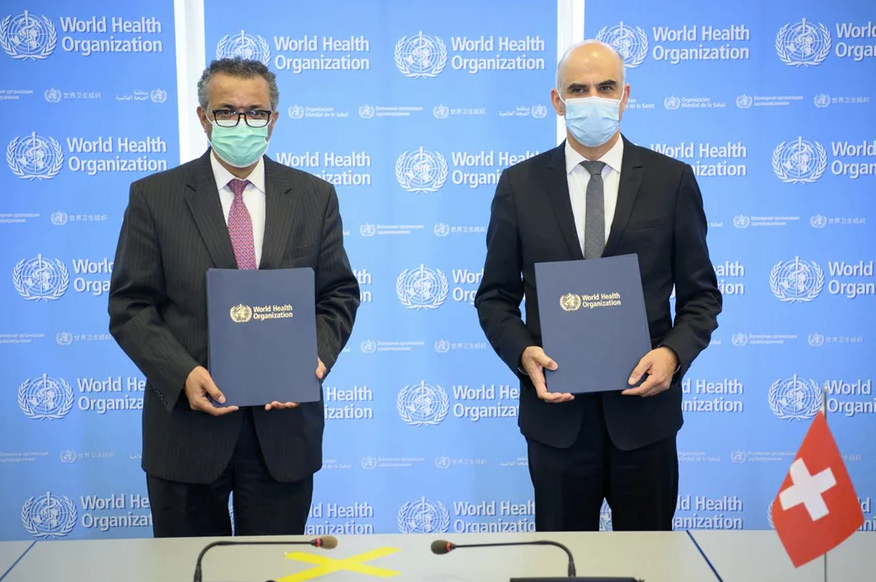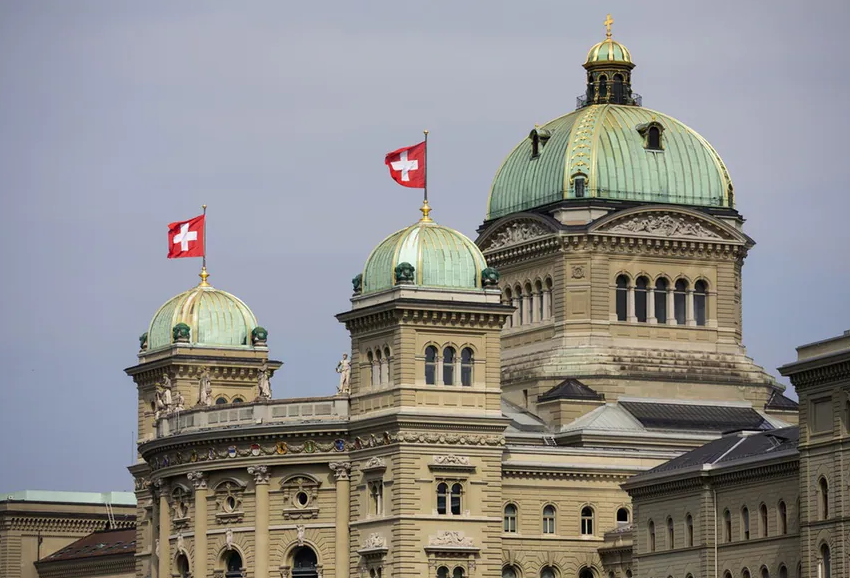Alain Berset, right, and Tedros Adhanom Ghebreyesus during a bilateral meeting in Geneva on Monday to sign a memo of understanding on the BioHub Initiative Keystone / Laurent Gillieron Switzerland and the World Health Organization (WHO) have agreed to launch the first WHO BioHub Facility. This will enhance the rapid sharing of viruses and other pathogens between laboratories and partners globally. Under the agreement, signed at the 74th World Health Assembly in Geneva on Monday, Switzerland will make available to the WHO the Spiez Biocontainment LaboratoryExternal link as a repository for Sars-CoV-2 viruses or other pathogens with epidemic or pandemic potential. “Close international collaboration to ensure the timely sharing of epidemiological and clinical data as
Topics:
Swissinfo considers the following as important: 3.) Swissinfo Business and Economy, 3) Swiss Markets and News, Featured, Latest News, newsletter
This could be interesting, too:
Nachrichten Ticker - www.finanzen.ch writes Die Performance der Kryptowährungen in KW 9: Das hat sich bei Bitcoin, Ether & Co. getan
Nachrichten Ticker - www.finanzen.ch writes Wer verbirgt sich hinter der Ethereum-Technologie?
Martin Hartmann writes Eine Analyse nach den Lehren von Milton Friedman
Marc Chandler writes March 2025 Monthly

Alain Berset, right, and Tedros Adhanom Ghebreyesus during a bilateral meeting in Geneva on Monday to sign a memo of understanding on the BioHub Initiative Keystone / Laurent Gillieron
Switzerland and the World Health Organization (WHO) have agreed to launch the first WHO BioHub Facility. This will enhance the rapid sharing of viruses and other pathogens between laboratories and partners globally.
Under the agreement, signed at the 74th World Health Assembly in Geneva on Monday, Switzerland will make available to the WHO the Spiez Biocontainment LaboratoryExternal link as a repository for Sars-CoV-2 viruses or other pathogens with epidemic or pandemic potential.
“Close international collaboration to ensure the timely sharing of epidemiological and clinical data as well as biological materials is of utmost importance,” said Health Minister Alain Berset.
Based in Spiez, canton Bern, the facility will serve as a centre for the safe receipt, sequencing, storage and preparation of biological materials for distribution to other laboratories, in order to inform risk assessments and sustain global preparedness against these pathogens.
Berset and WHO Director-General Tedros Adhanom Ghebreyesus signed the memorandum of understanding on the fringes of the World Health AssemblyExternal link, which brings together health ministers from the WHO’s 194 member states.
‘Scandalous inequity’
In his opening speech at the assembly, Berset said Switzerland supported an international treaty against pandemics. He appealed to member states to do the same.
“The values of multilateralism, solidarity and international cooperation are crucial in combating the Covid-19 pandemic effectively,” Berset said. A universal and coordinated approach to health protection is indispensable, he added, because no country is capable of dealing with such a crisis alone.
At the same time, Berset called for the leading role of the WHO in preparing for and combating health crises to be strengthened. He also assured the WHO of Switzerland’s commitment to implementing international recommendations after the Covid-19 crisis.
For his part, Tedros said the Covid-19 pandemic was being perpetuated by a “scandalous inequity” in vaccine distribution.
“The world remains in a very dangerous situation,” he told the assembly as he set new targets for protecting people in the poorest countries.
“As of today, more cases have been reported so far this year than in the whole of 2020. On current trends, the number of deaths will overtake last year’s total within the next three weeks.”
Vaccine distribution
Tedros said more than 75% of all vaccines had been administered in just ten countries.
“There is no diplomatic way to say it: a small group of countries that make and buy the majority of the world’s vaccines control the fate of the rest of the world.”
The Covax facility, run by the WHO and the GAVI vaccine alliance, has delivered 72 million vaccine doses to 125 countries and economies since February – barely sufficient for 1% of their populations, Tedros said.
He urged countries to donate vaccine doses to Covax to enable 10% of the populations of all countries to be inoculated by September and 30% by the end of the year. This meant vaccinating 250 million more people in just four months, he said.
Switzerland is participating in the Covax scheme.
The World Health Assembly lasts until June 1 and will be held virtually again this year because of the Covid-19 pandemic.
Tags: Featured,Latest news,newsletter








